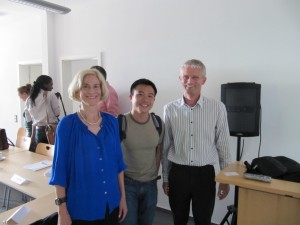Abstract: Hume’s Sensibilist Naturalism
The paper sets out to try and make sense of the role that metaphysics plays for Hume in our understanding of the world and our place in it. I’m going to pursue this question in terms of two issues: reason and scepticism, and reason and sensibility. On scepticism, I’ll argue that Hume is not a sceptic as such: he believes that there are valid metaphysical arguments that lead to scepticism, e.g. about causation, but his conclusion is: so much the worse for metaphysics, taken as a reliable form of understanding in its own right. On sensibility, which is the main focus of the paper, I want to explore the idea that understanding for Hume consists in a judicious combination of propositional (e.g. metaphysical) considerations and non-propositional considerations.
Bio (or use web page):
Professor of History of Philosophy and Science, University of Sydney, Australia, and Professor of Philosophy, University of Aberdeen, Scotland.
Author of: Descartes, An Intellectual Biography (OUP, 1995); Francis Bacon and the Transformation of Early-Modern Philosophy (CUP, 2001); Descartes’ System of Natural Philosophy (CUP, 2002). For the past 15 years, I have been working on a projected 6-volume account of the emergence of a scientific culture in the West. The first volume appeared as: The Emergence of a Scientific Culture: Science and the Shaping of Modernity, 1210-1685 (OUP, 2005). The second volume, The Collapse of Mechanism and the Rise of Sensibility: Science and the Shaping of Modernity, 1680-1760 is to be published by OUP in December. I am presently at work on the third volume, The Humanization of Nature and the Naturalization of the Human, which will take the story up to the 1820s or 1830s.
Philosophy Seminar Series: 15 July 2010, 2-4pm, Philosophy Resource Room; Speaker: Stephen Gaukroger (Professor, History of Philosophy and Science, University of Sydney and Professor, Philosophy, University of Aberdeen); Moderator: Dr. Loy Hui Chieh
Abstract: The paper sets out to try and make sense of the role that metaphysics plays for Hume in our understanding of the world and our place in it. I’m going to pursue this question in terms of two issues: reason and scepticism, and reason and sensibility. On scepticism, I’ll argue that Hume is not a sceptic as such: he believes that there are valid metaphysical arguments that lead to scepticism, e.g. about causation, but his conclusion is: so much the worse for metaphysics, taken as a reliable form of understanding in its own right. On sensibility, which is the main focus of the paper, I want to explore the idea that understanding for Hume consists in a judicious combination of propositional (e.g. metaphysical) considerations and non-propositional considerations.
 About the speaker: Stephen Gaukroger is Professor of History of Philosophy and Science, University of Sydney, Australia, and Professor of Philosophy, University of Aberdeen, Scotland. He is the author of: Descartes, An Intellectual Biography (OUP, 1995); Francis Bacon and the Transformation of Early-Modern Philosophy (CUP, 2001); Descartes’ System of Natural Philosophy (CUP, 2002). For the past 15 years, he has been working on a projected 6-volume account of the emergence of a scientific culture in the West. The first volume appeared as: The Emergence of a Scientific Culture: Science and the Shaping of Modernity, 1210-1685 (OUP, 2005). The second volume, The Collapse of Mechanism and the Rise of Sensibility: Science and the Shaping of Modernity, 1680-1760 is to be published by OUP in December. I am presently at work on the third volume, The Humanization of Nature and the Naturalization of the Human, which will take the story up to the 1820s or 1830s.
About the speaker: Stephen Gaukroger is Professor of History of Philosophy and Science, University of Sydney, Australia, and Professor of Philosophy, University of Aberdeen, Scotland. He is the author of: Descartes, An Intellectual Biography (OUP, 1995); Francis Bacon and the Transformation of Early-Modern Philosophy (CUP, 2001); Descartes’ System of Natural Philosophy (CUP, 2002). For the past 15 years, he has been working on a projected 6-volume account of the emergence of a scientific culture in the West. The first volume appeared as: The Emergence of a Scientific Culture: Science and the Shaping of Modernity, 1210-1685 (OUP, 2005). The second volume, The Collapse of Mechanism and the Rise of Sensibility: Science and the Shaping of Modernity, 1680-1760 is to be published by OUP in December. I am presently at work on the third volume, The Humanization of Nature and the Naturalization of the Human, which will take the story up to the 1820s or 1830s.
More information on the Philosophy Seminar Series can be found here. A list of past talks in the series can be found here.
 You should never trust anything that you read on the internet. That has always been my general policy and is one that has rarely steered me wrong. Except that it was the reason why I was under three layers of winter clothing, standing at the Tübingen train station, in the Swabian summer sun. Who would have expected the German weather forecast site to get their prediction right? Under my coats and heavy backpack, the delightful Tübingen weather, which persistently refused to get worse throughout my stay there, was insufferable. The long, never-ending 800 metre walk to the youth hostel where I was to spend the week brought to my mind the cantos of Dante’s Inferno. On top of that, when I got to the hostel, I learnt that I was not provided a bath towel. Thankfully, as an avid fan of Arthur Dent and Ford Prefect, I had brought my own, but imagine if I had not done so and had to rent one from the hostel! You would imagine that the organisers of the Unseld Summer School, after flying me across two continents, paying for my lodging as well as some of my meals, would have been willing to pay for a towel rental, but there was obviously a limit to their generosity.
You should never trust anything that you read on the internet. That has always been my general policy and is one that has rarely steered me wrong. Except that it was the reason why I was under three layers of winter clothing, standing at the Tübingen train station, in the Swabian summer sun. Who would have expected the German weather forecast site to get their prediction right? Under my coats and heavy backpack, the delightful Tübingen weather, which persistently refused to get worse throughout my stay there, was insufferable. The long, never-ending 800 metre walk to the youth hostel where I was to spend the week brought to my mind the cantos of Dante’s Inferno. On top of that, when I got to the hostel, I learnt that I was not provided a bath towel. Thankfully, as an avid fan of Arthur Dent and Ford Prefect, I had brought my own, but imagine if I had not done so and had to rent one from the hostel! You would imagine that the organisers of the Unseld Summer School, after flying me across two continents, paying for my lodging as well as some of my meals, would have been willing to pay for a towel rental, but there was obviously a limit to their generosity.
